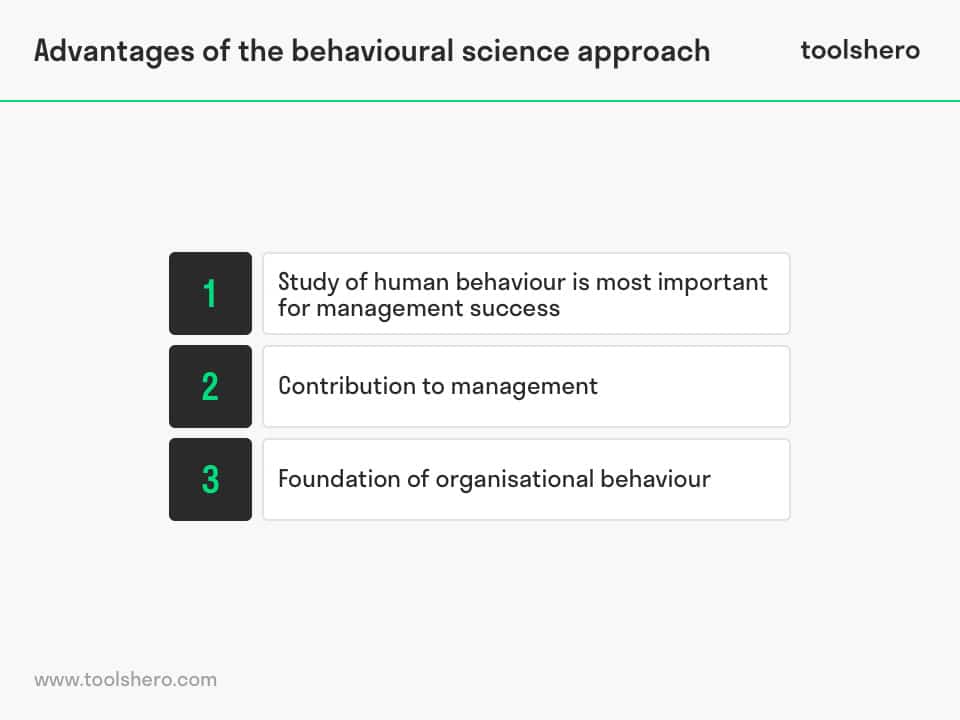Behavioural Science Approach to Management

Behavioural Science Approach to Management: this article provides a practical explanation of the Behavioural Science Approach to Management. Its origins can be found in the study of behavioural sciences (such as psychology, industrial psychology, sociology, anthropology, etc.). The goal is to use theories from these sciences to create effective organisational change.
What is the Behavioural Science Approach to management?
The behavioural science approach to management or Behavioural Science Approach of management is focused on the psychological and sociological processes (attitude, motivations, and group dynamics) that influence employee performance. While the classic approach is focused on the work done by employees, the Behavioural Science Approach to management focuses on the employees themselves.
Many of the theories in the behavioural perspective have been included in the behavioural science approach of management. The Hawthorne studies, for instance, use the scientific method and are considered to be part of the behavioural science approach.
Behavioural Science Approach to management within the area of business management is a specific application of this field and uses several specific types of behavioural observations. This includes concepts such as information processing, relationships, motivation, and organisational development.
Behavioural science approaches cover two broad categories: Neural – information sciences and social – relational sciences.
Information processing sciences focus on information processing of stimuli from the social environment by cognitive entities in order to take part in decision making, social judgement, and social perception for individual performance and the survival or organisms in a social environment.
These relate to psychology, cognitive sciences, psychobiology, neural networks, social cognition, social psychology, semantic networks, ethology, and social neurosciences.
Relational sciences are about relations, interaction, communication networks, associations and relational strategies or the dynamics between organisms or cognitive entities within a social system. These relate to fields such as sociological social psychology, social networks, dynamic network analyses, the agent-based model, and microsimulation.
Why the Behavioural Science Approach to management?
Behavioural Science Approach to management was developed as a response to consider the behaviour and motivation of employees. This led to changes in management, from a production focus (classic leadership theory) to a leadership style focused on the human needs of the employees, work-related satisfaction and proper working conditions.
Management is the efficient use of means, materials, capital, and human resources to achieve specific objectives and SMART goals. The management methods based on behavioural sciences are:
Organisational design
An effective organisational design is important. The organisation must be set up in such a way that the set goals can be achieved. The technology that is being used must regularly be updated.
Personnel management
Human resources are the most important resources an organisation has. The right methods for selection, training, motivation, role assignment, incentives, and opportunities for professional growth must be safeguarded
Communication
Communication between different levels is important for the functioning of the system. Insufficient information in the communication system results in: Slow reporting of events, slow delivery of products, and reduced efficiency of organisational performance.
Information systems
An efficient information system is important to manage all data. The information system plays an important role in monitoring and evaluation.
Management by Objectives (MBO)
Here the goals are established for each unit and subunit of the system. Plans to achieve these objectives are created and implemented.
Getting started
Using the theories, you can create effective organisational change. Behavioural Science Approach to management is based on the basic principles of the human relationships approach.
Here follow the most important advantages of the Behavioural Science Approach to management:
Study of human behaviour is most important for management success
Despite the development of many approaches for management studies, the behavioural science approach is very important. It focuses on a study of human behaviour; it determines the success/failure of management.
Contribution to management
The behavioural science approach has made an important contribution to management in the areas of group dynamics, motivation, communication, and leadership.
Foundation of organisational behaviour
The behavioural science approach forms the foundation of a new management discipline called organisational behaviour. Examples of interesting concepts of organisational behaviour are: informal groups, attitudes, personality, perception, individual and group behaviour.
The following steps help you to create effective organisational change:
Behavioural science approach embrace the principle that behaviour is the result of interaction between people and their environment. The environment consists of a variety of factors. A considered analysis of behaviour must take into account the individual’s current environment.
A ‘behavioural approach’ involves manipulating the environment in such a way that the likelihood of the goal behaviour is adjusted in the desired direction. In order to increase that likelihood, the reinforcement principle is applied. In order to decrease that likelihood, the punishment principle is applied. In order to eliminate behaviour, the extinction principle is used.
Examples of behavioural management in organisations are:
Reinforcement
Your employer has run into difficulty finding sufficient workers for a particular day. It announces a new policy of paying more to workers who volunteer to work on that particular day. This leads to employees showing initiative by discussing with each other who will be working on that day.
The environment change was the new policy. The reinforcement was the offer to pay more.
Punishment
A credit card company is faced with an increase of late payments. They announce that new costs for late payment will be increased to the maximum limit allowed. It results in a reduction of late payments.
The environment change was the change in fees for late payment. The punishment was paying a higher fee.
Extinction
Your dog was barking at the door to be let inside. People you were having over quickly opened the door to let the dog in. You don’t agree and start a policy of ignoring the barking and only opening the door when she looks you/them in the eyes and sits. As a result, the dog eventually stops barking under these conditions.
The change in the environment was opening the door in response to barking. Because when the dog barked, the door never opened again, there was no reinforcement. As a result she stopped barking. New behaviour was learned and reinforced
To summarise
The behavioural science approach broadly speaking is about understanding individual and group dynamics to initiate meaningful organisational development. The study of human behaviour in the context of organisational change is an integral part of enabling organisations to grow, adapt, and gain a competitive edge.
The simplest definition of behavioural science is that it studies human behaviour. For people working in digital marketing, behavioural science is a way to predict the future. You can use behavioural science by looking at how people behaved in the past. That way you’ll understand how people will behave in the future.
Now it’s your turn
What do you think? Do you recognise the explanation about the behavioural science approach, or do you have anything to add? In which scenarios do you think this method will be effective? What do you believe are success factors that contribute to the practical application of this theory?
Share your experience and knowledge in the comments box below.
More information
- Gravetter, F.J. en Forzano, L.B. (2014) Research Methods for the Behavioral Sciences: A Research-Based Experiential Approach
- Hayes, S. C., Barnes-Holmes, D., & Biglan, A. (2016). The Wiley handbook of contextual behavioral science. R. D. Zettle (Ed.). Chichester: Wiley Blackwell
- Lomax, R. G. (2000). Statistical concepts: A second course for education and the behavioral sciences. Routledge.
- Stangor, C. (2014) Research Methods for the Behavioral Sciences: 4th Edition
- Tannenbaum, R., Weschler, I., & Massarik, F. (2013). Leadership and Organization (RLE: Organizations): A Behavioral Science Approach. Routledge.
How to cite this article:
Sari, J. (2020). Behavioural science approach. Retrieved [insert date] from toolshero: https://www.toolshero.com/change-management/behavioural-science-approach/
Add a link to this page on your website:
<a href=”https://www.toolshero.com/change-management/behavioural-science-approach/”>toolshero: Behavioural science approach</a>
Published on: 06/03/2020 | Last update: 18/02/2022













